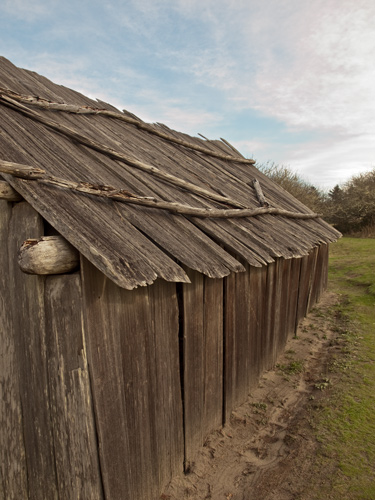In Search of Old Boards
Clatsop Plankhouse
Fort Stevens State Park
© 2010 by Kristopher K. Townsend. Permission to use granted under the Creative Commons Attribution-Share Alike 4.0 International license.
On 19 December 1806, Clark “despatched Sjt. Pryer with 8 men in 2 Canoes across Meriwethers Bay for the boads[1]In parts of 18th-century Britain, and among American Colonists and later immigrants who came from certain places in the British Isles, speakers typically elided the rhotic sound when it occurred … Continue reading of an Indian house which is vacant.” Pryor and his companions returned that afternoon with a load of “old boards,” but after all they were found to be “verry indifferent.” We are left to wonder what that verbal shrug meant. In Noah Webster’s 1806 Compendious Dictionary of the English Language, the word “indifferent” could mean either “poor” or “tolerable.” In any case, the odds are that the structure they pillaged, like many other seemingly useless dwellings they had seen along the lower Columbia, had not been permanently abandoned, but had been built to serve as temporary residences for one of two reasons: Coastal tribes often lived near the ocean in winter, and moved to alternate homes on nearby rivers during salmon runs, and since the dwelling in question was said to be located near the Netul river (present-day Lewis and Clark River), it might have been occupied only during a run that had taken place before the expedition arrived in early December, and would be reoccupied in late March. On the other hand, the house just might have been temporarily vacated by a native family for whom it had been made uninhabitable by a overwhelming infestation of Fleas, and its owners would be returning to it within a few weeks or months.
Questions of Property
Nowhere is there any indication that the Clatsops complained about the thefts, but they may have learned of it somehow, and discreetly brought the matter to the attention of one of the captains, for ten days later Clark explained, as if it was news to him, that “[t]he flees are So noumerous in this Countrey and difficult to get Cleare of that the Indians have difft. houses & villages to which they remove frequently to get rid of them.” In any case, no claims were made and no apologies were tendered. Not even, as far as we can tell, did the Americans consider putting their booty back where they found it before they left for home.
Elk Meat and a Canoe
In mid-March the men stole a Clatsop canoe as recompense for Indians’ theft of 6 elk carcasses the men had shot, even though the tribe’s chief had already made restitution for the elk by giving the captains three free dogs.[2]On 24 September 2011, belatedly but nonetheless sincerely, descendants of Captain Clark and numerous other volunteer contributors presented the people of The Chinook Tribe a 36-foot symbolic replica … Continue reading It was a lopsided deal both ways. If the elk meat hadn’t spoiled yet, three Indian dogs wasn’t fair payment for it. But the canoe was much more valuable than three elk in any case; a Clatsop watercraft was equal to a wife. Moreover, there is abundant evidence that the captains and their men were quick to respond to natives’ thefts of Corps property with demands for return or recompense, or at least with sinister threats. Yet across the estuary, back on November 15, Clark had brazenly admitted that his men were “all Comfortable in the . . . Camps they have made of the boards they found at the Town above.” At that point, they simply didn’t get the picture.
Notes
| ↑1 | In parts of 18th-century Britain, and among American Colonists and later immigrants who came from certain places in the British Isles, speakers typically elided the rhotic sound when it occurred before a consonant. In his phonetic spelling of “boards” (boads), William Clark clearly wrote an /a/ in place of an /r/, and probably uttered it as the unstressed neutral vowel now called a schwa (printed as ə; for pronunciation of the symbol see Wikipedia, s.v. Schwa). The substitution of the schwa for an /r/ is still characteristic of the speech of New Englanders from southern Massachusetts to New Hampshire. Dictionary of American Regional English, s.v. “board.” |
|---|---|
| ↑2 | On 24 September 2011, belatedly but nonetheless sincerely, descendants of Captain Clark and numerous other volunteer contributors presented the people of The Chinook Tribe a 36-foot symbolic replica of the ocean-going canoe the Corps of Discovery commandeered 205 years before. Seattle Times, 11 September 2011, online. |

